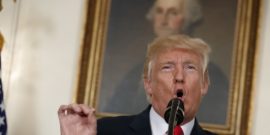President Trump’s inability or unwillingness to lead on a legislative agenda may trigger a renaissance of congressional government.
The Candidate of Coercive Democracy
Donald Trump is not the most usual candidate in this campaign season. That distinction belongs to Lawrence Lessig, a professor at Harvard Law School and now a candidate for the Democratic Party’s nomination. It is unusual for a professor to choose the Presidency as his starter office and doubly so when he is running on a single issue—reform of the electoral system. Perhaps triply so, when he promises to resign immediately after getting his reforms enacted.
While I admire citizens of accomplishment who are willing to put themselves forward, some of Lessig’s core ideas pose a threat to free speech and indeed to liberal democracy itself. In his book, Republic Lost, Professor Lessig argues that the Framers believed that elections should make the government dependent upon the people alone. That dependence, according to Lessig, was the basic principle of republican government at the time. As result, Congress can legitimately regulate campaign expenditures to prevent “the distortion” that would occur from permitting legislators from becoming dependent on those who make campaign contributions or expend large sums of money on elections.
Lessig tries to use the rhetoric of republican government to recast the equality argument against permitting citizens to spend independently on campaigns or make substantial contributions to candidates. These interventions, according to this argument, make some citizens more politically influential than others. But Lessig’s focus on dependence demonstrates why an equality argument cannot be rooted in the original Constitution.
The Constitution emphatically does not provide any measure for deciding how public opinion becomes “distorted.” The constitutional dependence of representatives does not come from their being in sync with the opinions of their constituents on any set of issues but on their getting the most votes at periodic elections. It is striking that the Constitution does not include any mechanism of direct democracy for measuring sentiment on particular issues so as to provide a baseline for following public opinion. Indeed, the Framers expressly rejected the idea that representatives should be required to follow the instructions of their constituents. Representatives were thus empowered to prefer the opinions they thought best, even if these opinions were those of a few people and even if those few had more money or more social influence.
And the deliberative autonomy of representatives reflects an important general point about the Framers’ understanding of the limits of democracy. Democracy was not to control the formation of opinion. That formation flowed from a spontaneous order where people exercised their rights under the First Amendment. Some people have an advantage in doing that. The wealthy do, because they can spend more. But so do media employees and proprietors. And I dare say that a professor at Harvard Law School has powerful platform for influencing the legal elite for the next generation—perhaps more powerful than any single wealthy person. For some reason, however, Lessig does not want to disempower the media or academics, although, as I have pointed out before, the scribal class is far more “distorting” than the rich because it is both powerful and far less ideologically representative.
Ultimately, Lessig and those of other campaign finance reformers want to create a democracy wholly antithetical to the vision of the Framers. Our Constitution supports a liberal democracy, where democracy serves as the handmaiden of liberty, and to that end, depends for its opinion formation on a liberal order of opinion. Lessig instead wants a democracy where the majority has the power to put people in jail in order to skew opinion as it prefers, giving, for instance, more power to the scribal class over the productive class. He demands a terrifying centralization of power to an incoherent objective: the will of people must be allowed to form the will of the people! Bernie Sanders, who Lessig thinks would be a good Vice-President for his ticket, wants a coercive economy. But Lessig’s notion of a coercive democracy may be even more dangerous.


